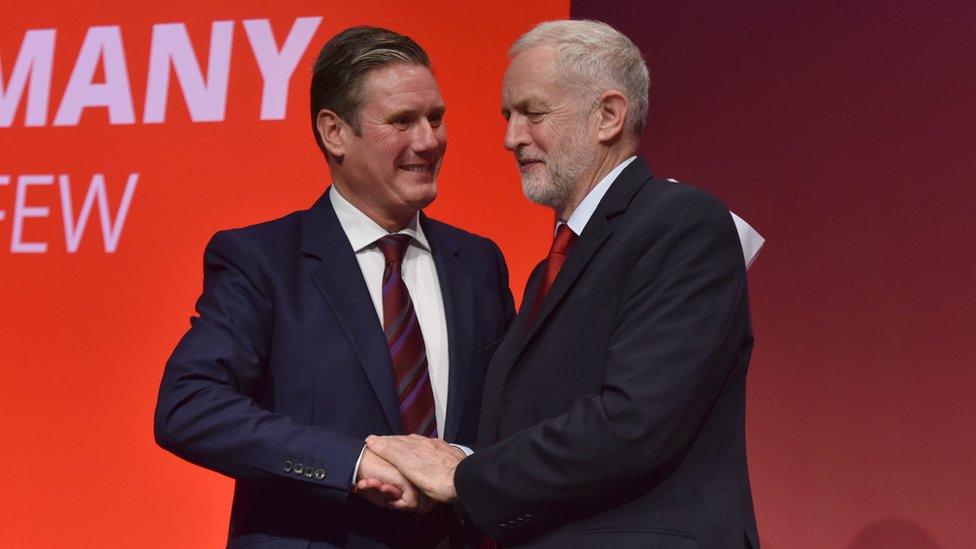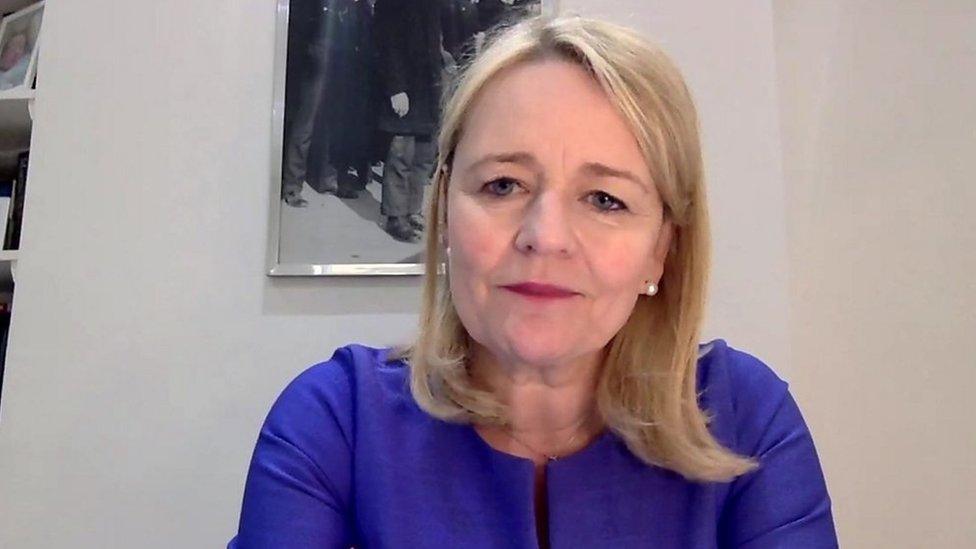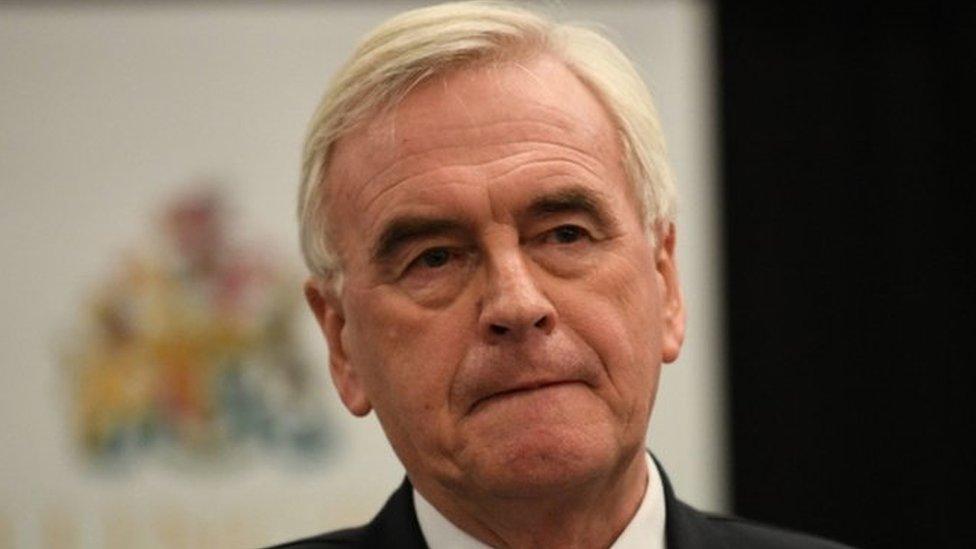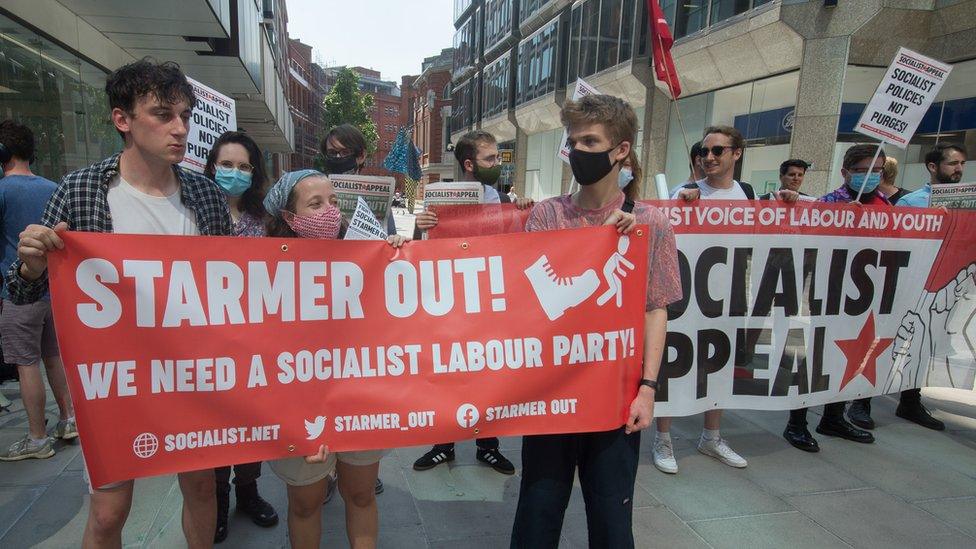Starmer warned Labour leadership rule changes risk 'civil war'
- Published

Proposed changes to how Labour elects a future leader have been criticised as an attempt to 'deCorbynise' the party.
Labour leader Sir Keir Starmer has re-opened a bitter internal dispute just days ahead of his party's conference.
He has tried to convince trade unions to back a plan to scrap the leadership rules which enabled predecessor Jeremy Corbyn to get elected - but has so far failed to secure their support.
Currently grassroots members elect the leader - a system introduced by Ed Miliband.
But Sir Keir wants to return to an "electoral college", where ordinary Labour Party members would only account for a third of the votes in a future leadership contest.
MPs would be given a further third of the vote - a move backed by "moderate" members of the party as they believe elected politicians more closely reflect the views of constituents and not just activists.
The unions would also be given a third of the vote.
That may, on the surface, seem to appeal to the unions, but Labour politics is never that simple.
Between them, the unions account for half the votes at Labour conference, so they will have huge influence over whether the leadership rules will change.
Those under left-wing leadership see the proposed rule changes as an attempt to "de-Corbynise" the party - reintroducing rules which gave MPs too much say at the expense of the members.
In her first broadcast interview, Sharon Graham - the new leader of the influential Unite union - said Sir Keir had not floated the idea with her in advance and should "think again".
She told the BBC: "People will remember that at their conference, Labour talked about rules not issues. That's a huge error for them.
Sharon Graham says Labour should focus on "issues facing workers and communities" not the rules to elect a future leader.
"We are almost trying to save [the Labour leadership] from themselves. This is not the path to go down."
Ms Graham, who has written to Labour MPs urging them to oppose Sir Keir's position, argued: "This proposal to reduce the membership to one third of the vote, while inflating the vote of Labour MPs, is unfair, undemocratic and a backwards step."
Labour MP Sam Tarry, who serves in Sir Keir's frontbench team as a shadow transport minister, tweeted that he "cannot support a regressive plan to dilute Labour members' votes and divide our movement", adding: "We are one party and should all have an equal say in choosing who leads any Labour government."
The left-wing group Momentum condemned the move. Vice chair Callum Bell said: "These rule changes would mark the start of a civil war in the party. Starmer holds the membership in contempt."
And former shadow chancellor John McDonnell, also on the left of Labour, criticised Sir Keir for concentrating on "internal factional pursuits" as the party meets in Brighton for its first face-to-face conference since Covid hit.
But Labour MP Neil Coyle urged left-wingers to back the changes so that the party can improve its chances of winning power in the future, and get on with tackling issues voters cared about.
"We need to pick someone who can actually win for us and not another loser on an epic scale, like we had before," the Bermondsey and Old Southwark MP told the BBC's Politics Live.
Ed Miliband - who introduced the system Sir Keir wants to overturn - said it was "a leader's prerogative" to make changes adding: "I support his decision to do that."
"Keir Starmer's intention is to get the Labour Party in touch with voters - that is the key thing."
'Listening mode'
On Wednesday, Sir Keir argued his case directly to the unions which affiliate to Labour but I have been told there were "no takers" for his plan to change the rules.
A source told me the meeting was "cordial" and the Labour leader was in "listening mode" but the unions urged him to delay his plans so they could discuss them more widely with their members.
A joint statement from Labour and Mike Whelan - chair of the Trade Union and Labour Party Liaison Organisation - said the meeting was "positive" and that discussions "will continue".
Sir Keir added "this was never a take it or leave it conversation... I am continuing to take suggestions and have discussions about how we do everything we need to in order to make the Labour Party the party of working people again."
But insiders tell me that very little preparation had been done, and that the Labour leader has no guaranteed support.
For his plan to succeed he would need to win over three big unions - the GMB, shopworkers' union Usdaw and public service union Unison.
If it is clear that too many unions are opposed to it, the proposal will not go to Labour's conference.
If, however, two of those unions back him and another agrees to abstain, the proposal would go to Labour's National Executive Committee on Friday and then on to the full conference at the weekend.
The proposals in some form will go to Labour's National Executive Committee (the party's ruling body) on Friday night - only then will a decision be taken on whether to risk a conference vote.
Cautious leader?
Sir Keir has so far been seen as a cautious leader, but this would be a high-wire act, because he could be defeated either before conference or on the conference floor.
But allies are praising him for leading from the front and hope his authority will be strengthened if he wins.
I am told that he is willing to negotiate on the precise make-up of the electoral college and may be willing to give unions a bigger say in a leadership contest in order to get the proposal through.
Ahead of Wednesday's meeting with the unions, Sir Keir said the current rules "focus us inwards to spend too much time talking to and about ourselves".
"I know that this is difficult - change always is - but I think these changes are vital for our party's future."
He added: "I have said I will make the Labour Party the party of working people. I am determined that the Labour Party I lead focuses on the country, on the concerns of voters, so we need party reforms that better connect us with working people."
He will also propose to make it more difficult for local parties to oust - or deselect - MPs.
- Published16 July 2021
- Published26 August 2021

- Published17 September 2021

- Published11 October 2021

- Published21 July 2021
